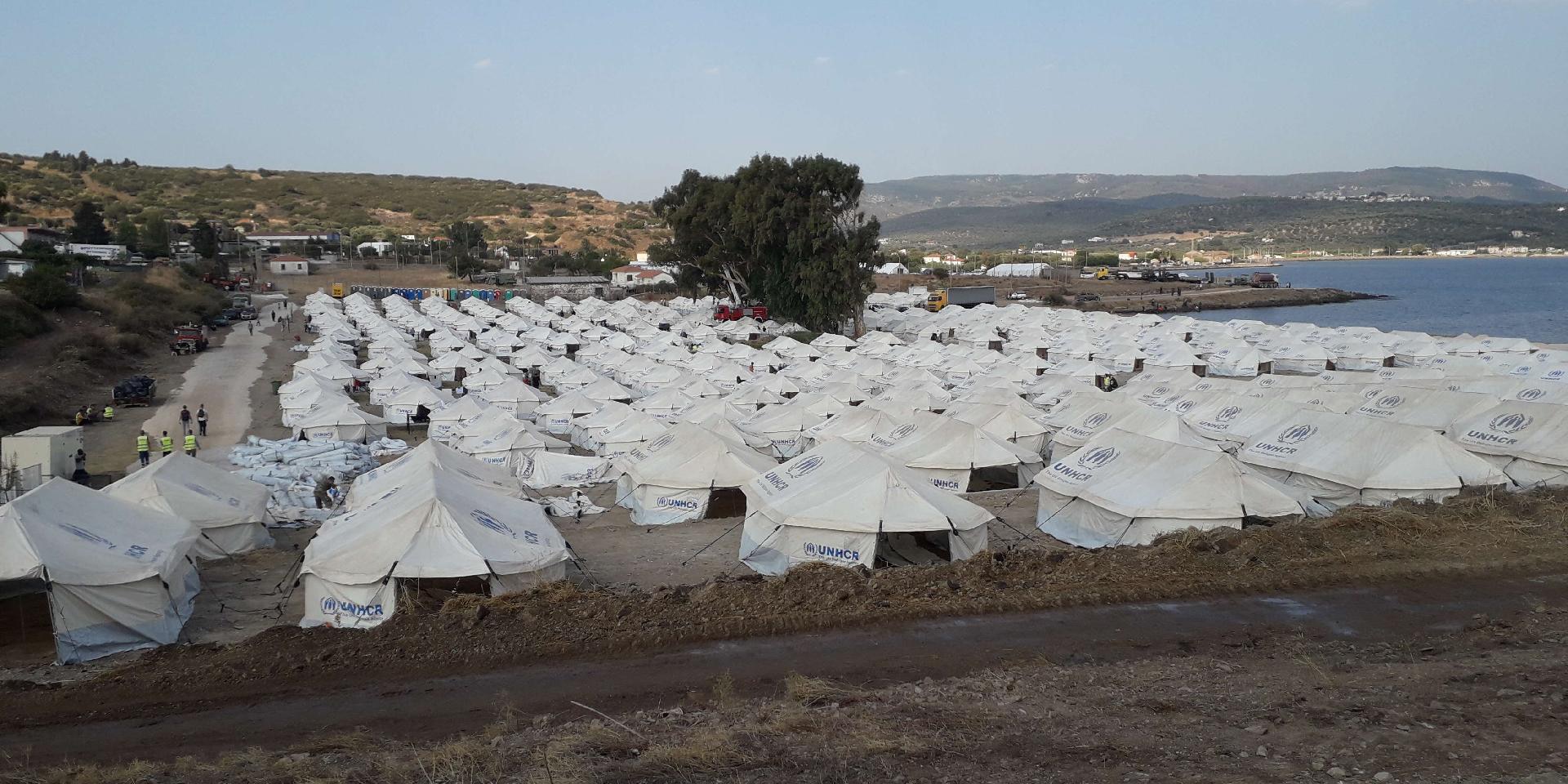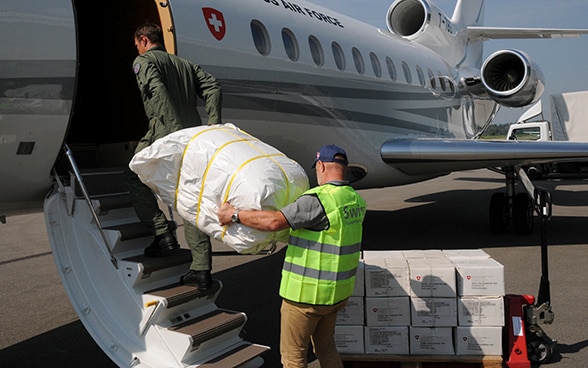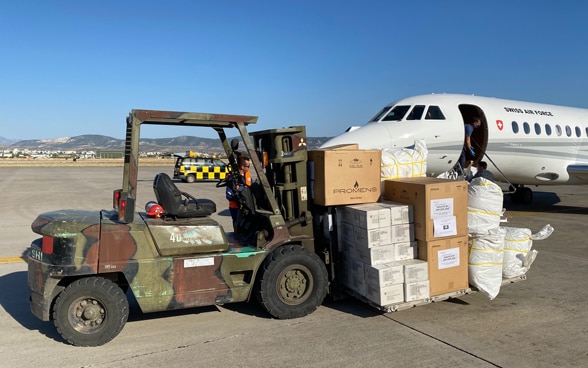Switzerland completes emergency aid operation on Lesbos
Switzerland responded immediately with emergency aid following a fire, which devastated the refugee transit camp on the Greek island of Lesbos. It ended its emergency aid activities on Wednesday 30 September, having restored access to clean drinking water for 10,000 people. It will continue its support in the form of medium- and long-term assistance.

After the fire in the refugee camp Moria, new tents have to be put up on Lesbos. Switzerland is helping to build the infrastructure. © FDFA
30.09.2020 – 15.00
Switzerland completes emergency aid operation on Lesbos
Switzerland responded immediately with emergency aid following a fire, which devastated the refugee transit camp on the Greek island of Lesbos. Over several weeks, Swiss Humanitarian Aid focused on access to safe drinking water, medical support in the context of the COVID-19 pandemic and disaster risk reduction. It also dispatched five tonnes of relief supplies to the facility. Switzerland ended its emergency aid activities on Wednesday 30 September, having restored access to clean drinking water for 10,000 people. It will continue its support in the form of medium- and long-term assistance.
"We provided emergency aid because this is one of the areas we specialise in. We were rapidly on the ground with our skills and expertise. Now it is time to hand over our work to the aid agencies and NGO," said SDC Deputy Director General Manuel Bessler, delegate for humanitarian aid and head of the Swiss Humanitarian Aid Unit (SHA). "We want to support our partners and the Greek authorities in this immense challenge, and this is why Switzerland will remain committed to Lesbos after its emergency aid operation."
15.09.2020 – 15.00
Swiss Humanitarian Aid sends further relief supplies to Lesbos
Switzerland responded promptly to the fire at the Moria migrant camp on the island of Lesbos and dispatched a first consignment of urgently needed relief supplies to Greece last Friday. Since then, members of the Swiss Humanitarian Aid Unit (SHA) have visited the destroyed camp together with the Greek authorities and evaluated the humanitarian needs on the ground.
Following this evaluation, a plane chartered by Swiss Humanitarian Aid took off from Zurich for Lesbos on the afternoon of 15 September. The cargo of around four tonnes of relief supplies included two water distribution modules and four water purification kits to provide safe drinking water. This will give around 10,000 people access to clean water. The materials on board also included generators, accessories such as hoses, and five large multi-purpose tents.
Swiss Humanitarian Aid is also sending four more SHA members to Lesbos: two water specialists, a logistician and a doctor. The doctor's main task will be to examine the extent of the COVID-19 situation among the camp's inhabitants.
Immediately after the fire broke out, Swiss Humanitarian Aid, part of the Swiss Agency for Development and Cooperation (SDC) within the Federal Department of Foreign Affairs, allocated up to CHF 1 million in emergency funding to meet the most urgent needs of people affected by the fire.
11.09.2020 – 13.00

On 11 September 2020 at 1 p.m., an aircraft of the Swiss Federal Air Transport Service took off from the airport Bern-Belp heading for Athens. On board around one tonne of humanitarian aid supplies urgently needed by the refugees on the island of Lesbos. The Greek authorities had asked Switzerland for sleeping bags, sleeping mats, water canisters or kitchen utensils, among other things. According to the Greek authorities, there is also a serious shortage of hygiene utensils such as soap, toothpaste or container showers following the fire in the Moria refugee camp on Lesbos.
On Wednesday morning, Federal Councillor Ignazio Cassis had already expressed his concern about the events on social media and expressed his condolences to the inhabitants of the Moria refugee camp. The humanitarian support he had offered there is now being implemented with the first relief flight.

With this emergency humanitarian aid, Switzerland is stepping up its support for the Greek authorities. For many years now, this has focused in particular on the issue of migration. Within this framework, the Swiss Agency for Development and Cooperation (SDC) has provided the reception centres on the Greek islands with tents, beds, blankets, medicines and basic medical equipment.
In addition, the SDC has for several years financed projects in the field of family reunification, the care of particularly vulnerable and unaccompanied minor asylum seekers and the protection of women in reception centres.
Cooperation among the European countries
For its part, the State Secretariat for Migration (SEM) is supporting a day centre for families and reception centres for unaccompanied minor asylum seekers. In addition, the Federal Department of Justice and Police (FDJP) granted a credit of CHF 1.1 million in April this year for projects run by aid organisations which mainly benefit children and young people in the camps and which finance immediate measures to combat the spread of the corona virus.
In 2020, under the Dublin system, Switzerland accepted 52 unaccompanied children and adolescents from Greece with family ties to Switzerland.
Swiss Humanitarian Aid
Swiss Humanitarian Aid acts before, during and after conflicts, crises and natural disasters to serve the interests of people in need. It focuses on the reconstruction and rehabilitation of affected areas, disaster risk reduction, the protection of vulnerable people and emergency relief efforts. Swiss Humanitarian Aid is part of the Swiss Agency for Development and Cooperation (SDC) within the Federal Department of Foreign Affairs (FDFA).
